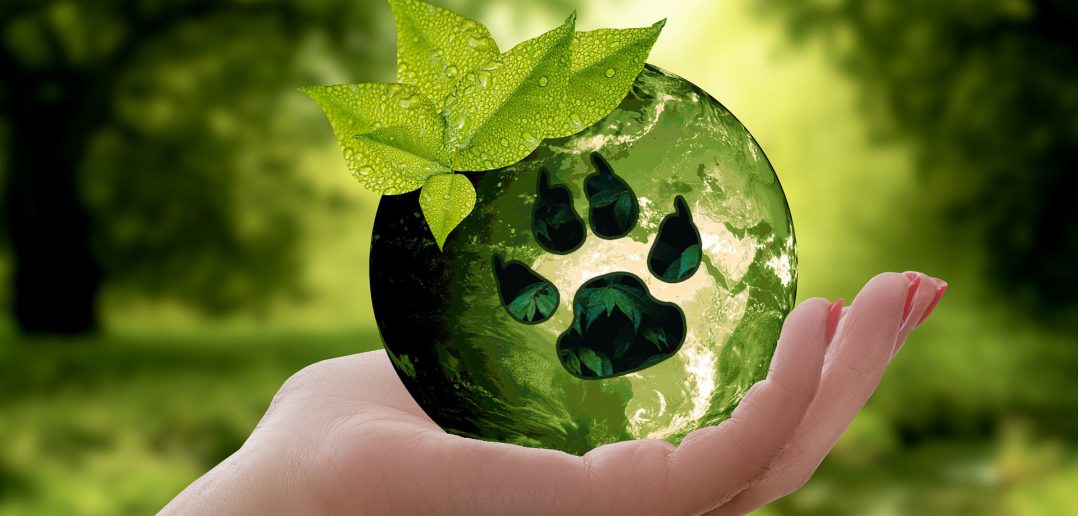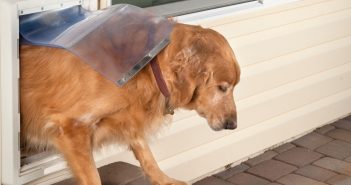PETCO has partnered exclusively with green social networking company, Greenwala.com, and renowned pet expert and radio personality, Tracie Hotchner, to help reduce your pet’s environmental impact.
From the 8 billion pounds of kitty litter heading to landfills each year to the effects of a pet’s carnivorous diet, pet parents should be aware of the substantial carbon footprint left by pets. To address this important matter, PETCO has developed an exclusive partnership with Greenwala.com, the leading online resource empowering people to go “green.” With the help of both Greenwala.com and Tracie Hotchner, author and host of NPR’s Gracie-Award winning show, “Cat Chat” on Sirius Radio, PETCO has compiled a list of simple ways to reduce the environmental impact of pets.
“When you consider the carbon pawprint of your pet, it also makes you think about some of the ways our own actions are affecting the environment,” said Hotchner. “I encourage pet parents to take this opportunity to make changes in their behaviors and purchases to help take all of us into a new era of environmental responsibility.”
1. Go Bio-degradable and Sustainable to Clean up Poop
Who wants to populate the landfill will plastic bags full of dog do-do? And are you aware that cat-litter made from clay is mined much like coal? Use bio-degradable poop bags when walking your dog and an eco-friendly cat-litter in the kitty box. Look for PETCO’s Natural line of litters made of corn, paper and pine pellets.
2. Think Adoption First
The HSUS estimates that animal shelters care for 6-8 million dogs and cats every year in the United States, of whom approximately 3-4 million are euthanized. Find the perfect addition to your family at one of PETCO’s monthly in-store national adoption events where local shelters match pets in need with parents.
3. Spay or Neuter Your Pet
Over 70K puppies and kittens are born every day. We are already at crisis mode in terms of homeless and abandoned animals. Thanks to the economy, this has only gotten worse. Help decrease the number of homeless animals in the United States by spaying or neutering your animals. Not only does it help control animal over-population and homelessness, but it also has been demonstrated to provide long-term health and behavioral benefits for pets.
4. Use Natural and Organic Pet Food
Your pets should eat the same quality foods you do. Natural, organic and holistic pet foods use proteins that are raised in sustainable, humane ways and do not contain hormones. They are preserved with natural vitamins. In addition, these healthy foods create less waste for you to clean up at the dog park. Look for the labels and see that they are full of vitamins, and nutrients and free of pesticides, and any attempt to bio-engineer the product. Check out the following high-quality brands; Halo, Blue Buffalo, and Wellness – all available at PETCO in their ‘Healthy Living Naturally’ sections.
5. Use Organic Grooming and Cleaning Products
Make cleaning product choices that are as safe for the planet as they are for you and your pets and children. Many pet shampoos and cleaning supplies use plant-based cleansers and natural bio-cultures to remove pet stains and odors. These products are completely non-toxic for pets and people, including natural flea removers. Look for Simple Solution Natural Cleaners and Earthbath Oatmeal & Aloe Totally Natural Pet Shampoo both available at PETCO stores and www.PETCO.com
6. Use Organic and Sustainable Pet Accessories (Bedding, Collars and Leashes)
We humans spend a third of life sleeping. Well so do most dogs. We obviously want to be comfortable so look for organic cotton and sustainable bedding to help give your dog a sound sleep. While you are at it, you can also look to get collars, leashes and PET bottles made from recycled materials or sustainable fibers without herbicides or pesticide as well. Bison branded collars and leads are made from recycled plastic bottles from landfills that are melted and spun into fibers that are woven into strong material. PETCO Naturals line of cat feeding bowls have been produced from fully compostable corn and their dog and cat toys are made with safe, natural vegetable dyes and non-toxic organic materials.
7. Avoid Pet Toys with Harmful Toxins Such as Lead
When looking for pet toys do the same thing that you would do for your kids and that’s to read the label and avoid toys with lead in them. Lead in products are equally as harmful for pets as they are for humans. In fact, the best thing to do is to get creative and create toys from recycled items that you have laying around the house.
8. Be Active and Live a Healthy Lifestyle
Get out and get active. Not only is this a great tip for humans, but it is absolutely the best thing to do for your dog. Don’t have a dog, then let your cat run around outside but make sure there is a cat enclosure. In fact, if you want to get out with your dog, go to a dog park to play with other dogs because usually the vegetation around the park can handle your dog jumping around looking for the ball that you threw a little too hard. However, when in doubt always leash your dog, since accidents can happen.
9. Planet-Friendly Manufacturing
Choosing natural and organic based products is important. However, it’s just as important to support brands that incorporate sustainability into their everyday business practices such as packaging, ingredient sourcing and recycling. Most companies proudly share their eco-conscious efforts on their websites where you can easily find it.
10. Be Committed to Your Pet
The worse thing a pet owner could do is not be committed to them once they own one. Owning a pet is a big responsibility and not just to have fun or because it is the latest trend/fad or it was in the latest pet movie. Yes pets are fun for all ages, but they need care like a child and if you are committed to your pet it will be easier for you to also implement the other tips above.
About PETCO
PETCO is a privately held specialty retailer that provides products, services and advice that make it easier for our customers to be great pet parents. We operate more than 1,000 stores in 50 states and the District of Columbia, as well as a leading pet products and information destination at www.petco.com. Our nonprofit organization, The PETCO Foundation, has raised more than $60 million since its inception in 1999 to help promote and improve the welfare of companion animals. In conjunction with the Foundation, we work with and support about 6,200 local animal welfare groups across the country to help find homes for more than 200,000 adoptable animals every year.
About Greenwala Inc. A green social networking and media company, Greenwala is an online community made of people who help others live a greener lifestyle by sharing their knowledge, green experiences and actions with friends, family and the world. Greenwala members can read expert articles, post comments and blogs, enter and vote on socially conscious contests, join or start groups, find new friends and earn points that benefit socially responsible non-profits. No longer available at greenwala.com, but you can still find greenwala (and the founder) on Twitter (twitter.com/greenwala and twitter.com/chiefwala).





11 Comments
Terrific work! This is the type of information that should be shared around the web. Shame on the search engines for not positioning this post higher!
What a great resource!
There needs to be more environmentally friendly pet companies out there and pet owners do needs to take these tips a little more seriously. Every time I see someone walking there dog, chances are 90% of the time they have a plastic bag in their hand, so i definitely agree with tip #1.
My pooch and I are going to work on this list. I think of myself as being eco-friendly but haven’t really connected that to my pet.
wow! thanks for this. i’ve been looking around for this. This is very helpful.
.-= Veterinary Fort Worth´s last blog ..Worms Destroy Dog’s Heart =-.
Excellent post. Most pet lovers also claim to be nature lovers but we never really realize what our actions are doing to the environment.
.-= Tim Kessler´s last blog ..Dealing With Ich In A Fish Tank =-.
What a great resource!
Interesting read. There’s currently quite a lot of data about this subject around and about on the net and some are most definitely better than others. You’ve caught the detail here just proper which makes for a refreshing change – thanks.
Really interesting thoughts about reducing a “carbon pawprint”. I’ll have to use some of these ideas in my house of 2 dogs and 2 cats. Thanks
I’ve stopped using plastic to pick up my dog’s poop. I have also shifted to organic dog food.
Pingback: Loch Lomond Log Cabins